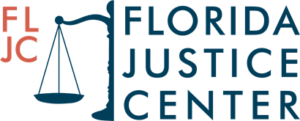Over 428 Services Provided by 32 Groups in Coconut Grove Last Saturday
Over 125 people in underserved Miami community empowered with access to legal and social services.
Miami, FL (March 29, 2024) –
The Miami nonprofit and legal communities came out in full force on Saturday to provide free services to help justice-impacted get back on their feet and back to work. 32 groups united to give access to resources to the underserved residents of Coconut Grove on Saturday, March 23, 2024 at the Greater St. Paul AME Church. Despite rain and a flood warning, over 125 people braved the weather to receive 428 services over a span of just six hours.
With a median income of just $14,400 per year, those assisted during this fantastic event were earning well below a living wage. Hosted by Florida Justice Center and the Gwen. S Cherry Black Women Lawyers Association, in collaboration with REFORM, the Carrie Meek Foundation, Miami-Dade County, and the NAACP South Dade Branch, this event was deemed an unmitigated success by all those in attendance.
The majority of those in attendance sought assistance with sealing and expunging arrest records, driver license reinstatement, finding affordable housing, and job placement. A large number also met with experts regarding mugshot removal, obtaining government benefits, restoring voting rights, and early termination of probation. 89.6% of those attending the event self-identified as Black, multi-racial, Native American/First Nation, or Hispanic/Latinx, indicating that the event achieved its goal of reaching those populations most disproportionately affected by the criminal legal system.
Held year round, Florida Justice Center’s signature Second Chance Events are a way of bringing communities throughout the state together for a common cause: to provide access to resources in underserved neighborhoods. This event included community partners helping with housing, employment, food security, government benefits, fines and fees, immigration, sealing and expungement, driver license reinstatement, HIV testing, and more.
“I’m overwhelmed and inspired by the outpouring of support, the kindness, and the empathy that was shown for this day of community togetherness and service. Services exist to help people returning from prison and jail, but they often are unable to access them. We’re working to fix that,” said Florida Justice Center Executive Director Jonathan Bleiweiss.
Partners providing assistance included Agape Network, Alive & Well Community Partners, Andrew Kemp-Gerstal, Esq. of Liebler Gonzalez & Portuondo, Catholic Legal Services, Circle of Brotherhood, Collective Empowerment Group, Coral Gables Adult Education Center, Dade Legal Aid, David Pina, Esq., Empowerment Zone Reentry Initiative (EZRI), Engage Miami, Florida Health, Gwen S. Cherry Black Women Lawyers Association, Goodwill South Florida, Florida International University, Florida Justice Center, TerryAnn Howell, Esq. of Law Office of TerryAnn S. Howell, Legal Services of Greater Miami, Lotoya Brown, Esq., Miami Bridge/LSF, Miami-Dade Public Defender’s Office – Sophia Montenegro and Devon Silverang, Esq., Midway Specialty Care Center, Melba Pearson, Esq. of MVP Law, NAACP South Dade Branch, Michael Oluwu, Esq. of Oluwu Law, Re-Entry One, REFORM, Suited for Success/Dress for Success Miami, Three Hundred Letters, VoteRiders, Wilkie D. Ferguson, Jr. Bar Association, YMCA of Greater Miami, and YWCA of South Florida.
To learn more about second chances and to make a tax-deductible donation, visit FLJC.org
Media
Download: Coconut Grove Second Chance Event Impact Report














ABOUT FLORIDA JUSTICE CENTER
Florida Justice Center is the state’s only legal aid organization dedicated to helping people with justice-involvement. Authorized by the Florida Supreme Court, FLJC works to lower the effects of an arrest through free and low-cost legal services, as well as connections to community service providers.
With a mission to empower individuals by providing legal support, community education, and removing barriers to success caused by the criminal justice system, FLJC succeeds in helping thousands of individuals each year.
2598 E Sunrise Blvd
Suite 2104
Fort Lauderdale, FL 33304
Media Contact:
Alex Saiz, Esq.
(954) 758-7555 x501
media@FLJC.org
